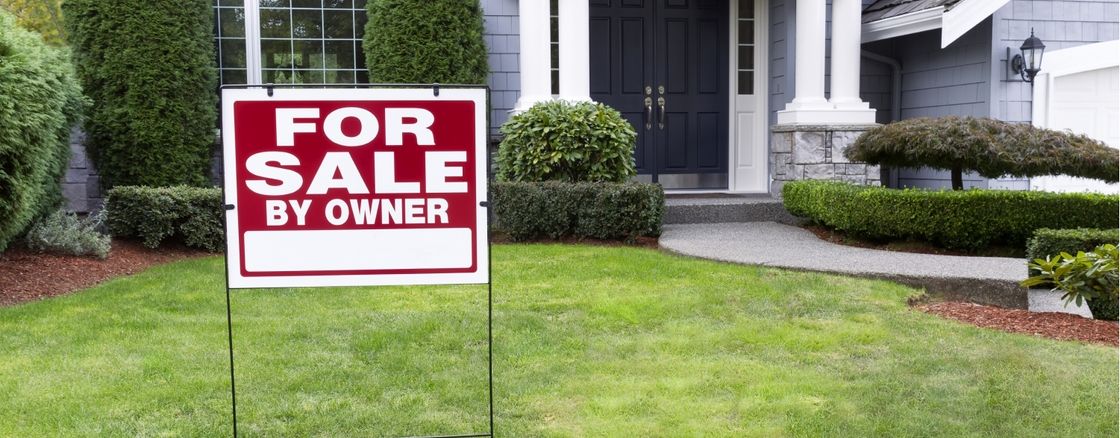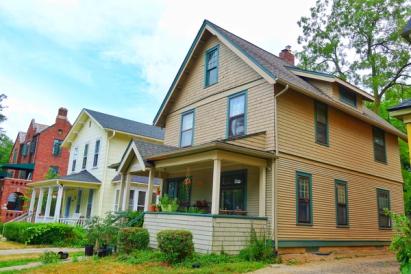Should You Buy a For Sale by Owner (FSBO) Home?
Written by:
Andrew Tavin
Andrew Tavin
Personal Finance Writer
Andrew Tavin a contributing writer for Own Up.
See full bio
Fact Checked by:
Dan Silva
Dan is the Vice President of Marketplace Lending at Own Up. Throughout his career, he has held executive leadership positions in the mortgage and banking industry.
See full bio

The pandemic did little to slow the increase in home prices. In November 2023, the median home sale was $387,600,000, up 4% from the previous year, according to the National Association of Realtors.
In an effort to save on agent fees, some sellers have taken the "for sale by owner," or FSBO route. FSBO homes may be cheaper for potential buyers but the process can come with its own unique set of challenges. Let’s talk about them.
Why Do Some Sellers Choose FSBO?
There isn’t one set amount that sellers are required to pay their real estate agent, the National Association of Realtors ® says; however, if you do some searching, you may see figures between 5% and 6%. The seller’s real estate agent typically shares realtor a percentage of their earnings, so in a sense, the seller of the home is paying both agents for their time.
The commission cost is often a consideration when setting the home sale price, so it’s possible that an FSBO home could potentially list for tens of thousands of dollars cheaper than a home that’s listed by an agent.
Some real estate agent organizations have collected data in an attempt to disprove the benefits of FSBO. The National Association of Realtors ® reported the typical FSBO home in 2021 sold for $225,000, versus $330,000 with a real estate agent. Obviously, that difference is enough to make up for the agent commission multiple times over. However, it's important to remember that there are other factors that could contribute to that striking correlation.
How the Internet Changed Home Buying
Before the Internet, FSBO home sales were much harder to market. Sellers mainly depended on word of mouth, yard signs, and classified ads.
These days, online resources make it easy to do the more common hybrid model between selling on your own and using a real estate agent. Sale-by-owner websites like Isoldmyhouse.com and Forsalebyowner.com offer packages that include a listing of the home on Multiple Listing Services (or MLS), which is essentially a database of properties on the market. Adding a property to the MSL drastically increases the number of prospective buyers who see a house.
The commission structure is also changing as real estate agents take on different roles and buyers become more independent. For example:
- Buyers often do comprehensive online searches for homes, even if they are working with an agent.
- Listing agents have lock boxes, so they don't need to open a property for a potential buyer to view it.
- Automated systems let buyers set up home showing appointments.
- Some agents also work for larger companies, accepting a regular salary in place of a larger commission.
These are some of the reasons a seller may negotiate commission rates below 6%.
Finding an FSBO Home
The National Association of Realtors' ® 2023 report found that 86% of homebuyers used a real estate agent to purchase their home compared to 10% who purchased directly from the owner.
More buyers, however, said they started their search online, at 47%, versus 18% who contacted an agent as the first step of their search. Ninety-six percent of buyers, a vast majority, said they used online tools at some point in their search process.
Some potential tools provide access to the aforementioned MLS listing service that displays homes being sold by agents and those in a hybrid for-sale-by-owner arrangement. MLS listings are also distributed to Zillow, Trulia, and Realtor.com.
Buying an FSBO House with a Buyer's Agent
There are a lot of responsibilities normally handled by a seller's agent that will instead be handled by a property owner in an FSBO situation. These can include everything from putting out yard signs to hiring professional photographers for real estate website listings to making sure the selling process proceeds smoothly.
This is one reason some real estate professionals will avoid steering prospective buyers to FSBO properties or even refuse to work with non-agent-listed homes altogether – they want to make sure the process runs by the book and may have concerns about dealing with an inexperienced seller.
Finally, if the seller doesn't want to pay the commission fee of a traditional agent, the prospective buyer could be on the hook for some of that cost even if their agent is willing to deal with a FSBO listing. That’s because the buyer agent typically receives their commission from the seller, and either way, they need to get paid! If the seller isn’t willing to cover the cost during a FSBO transaction, the buyer may end up responsible.
Still, a buyer's agent could be worth the cost even if you're considering sale-by-owner listings. They focus on finding you a house in your desired area price range, negotiating a price, and guiding you through the closing process.
You can talk to different agents to learn about their level of service and their opinions on sale-by-owner property.
Buying an FSBO House Without an Agent
While we wouldn't advise buying a house without an agent, if you do take that path, you' will need to be extra diligent. Here are a few checklist items to remember:
1. It’s a lot of work.
You need to be prepared to do all the work an agent would have done for you. This starts with getting a mortgage pre-approval letter, which determines the home price range you can afford. You will also need to look at real estate listings and set up visits to see homes for sale.
2. You will need to understand the market.
Research the local market to determine whether the home you're considering is reasonably priced. A house priced high above the appraised value will make it harder to be approved for a loan. Plus, no one likes overpaying, right? Make sure you consider closing costs, in addition to the down payment, when evaluating the listing price of a house.
3. Learn which reports and disclosures you need – and ask for them!
Be sure to ask the seller for a property disclosure statement. This form, a legal requirement in most areas, lays out any flaws and gives your home inspector a road map of potential issues to check.
Additionally, you should receive a Comprehensive Loss Underwriting Exchange, or CLUE, report for the prospective home. This is something the seller will need to request and provide. It shows any insurance claims on the property over seven years, including water damage, fire, and other structural damage claims.
4. Be prepared to negotiate.
When it's time to make an offer, be prepared for a period of back-and-forth negotiation. FSBO homes are more likely to be priced out of line with the market as the owner may be an inexperienced seller. Without agents to handle the negotiations, it's especially important to maintain good relations with the seller.
5. Be prepared to deal with money and documents.
You'll be required to provide an earnest money deposit when you make an offer. The amount may depend on market trends and will need to be held by an agreed upon escrow agent through the closing timeline.
Once you've settled on a price, it's time for the purchase and sale agreement. The purchase and sale agreement is a binding legal document. It states the final price for the house and the purchase terms, as negotiated between a buyer and a seller.
A real estate agent usually handles this part of the process, but at the very least, you should consider hiring a real estate attorney to manage the complicated paperwork. Websites like Justia.com offer a database of attorneys by specialty and location. A mortgage advisor may also be able to point you in the right direction.
6. Consider contingencies to protect your personal finances.
The closing paperwork should also include contingencies that must be met for the sale to go through. These commonly include a title contingency to make sure the title is free and clear, a home appraisal to make sure the home is worth the purchase price, a financing contingency in cases where the buyer can't get financing, a home inspection contingency to make sure the house is as reported, and in cases where the buyer is selling a house, a home sale contingency.
7. There are responsibilities outside of the purchase contract.
There's still a lot to do while the purchase and sale agreement is being hammered out. An inspection needs to be performed either before the signing or as soon as possible afterward so any inspection contingencies can be activated. HomeInspector.org or a mortgage advisor can help you find an inspector in your area.
Potential buyers will also need an appraisal of the home to ensure it is valued at the selling price. If you're applying for a mortgage, the lender will likely select the appraiser for you. If the appraised value is below the purchase price, it may prevent you from securing financing. You'll have to abandon the sale or attempt to negotiate a new purchase contract.
You'll also need to work with a title company. Title companies certify that the house for sale is actually owned by the person selling it and will provide title insurance to safeguard the new ownership.
Of course, none of that will matter if you don't have the money to purchase your perfect home. Whether it's agent-assisted homes or FSBOs, you'll need a mortgage lender.
8. The process is time consuming.
The closing and financing process can feel like a full-time job, but it pays to be careful. You don't want the discounted sale-by-owner listing you found to end up costing you much more in the long run because of an oversight in the purchase contract.
Also, make sure to shop around for your lender. Homebuyers often don't, and this is a huge mistake.
The Bottom Line
Buying a home is already a complicated process, and an FSBO sale can be even more challenging. There is a reason most people use real estate agents for a home sale, but it can be done without one if you are willing to be diligent and hire experts as needed.


